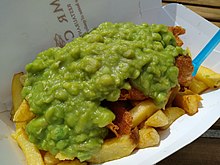Mushy peas
 | |
| Place of origin | United Kingdom |
|---|---|
| Region or state | England |
Mushy peas are dried marrowfat peas which are first soaked overnight in water with baking soda, and then rinsed in fresh water, after which the peas are gathered in a saucepan, covered with water, and brought to a boil, and then simmered until the peas are softened. The mush is seasoned with salt and pepper.[1]
Throughout England (Northern England and the Midlands in particular) and Republic of Ireland they are a traditional accompaniment to fish and chips. They are not a particularly traditional addition in this context in Scotland. In Northern England they are also commonly served as part of a popular snack called pie and peas (akin to the South Australian pie floater; but instead of the thick pea soup of the floater, in pie and peas it is mushy peas which accompany the meat pie) and are considered to be a part of traditional British cuisine. They are sometimes also packed into a ball, dipped in batter, deep-fried, and served as a pea fritter.[2] Mushy peas can also be bought ready-prepared in tin cans.
Local variants
[edit]
In Yorkshire, Nottinghamshire, Derbyshire and parts of Lincolnshire, mushy peas are often served as a snack on their own. In Nottinghamshire they are traditionally accompanied by mint sauce, and sold at open-air events such as fairs or fêtes. In Derbyshire and Nottinghamshire, mushy peas served with chips is called a 'pea mix,'
A variant (particularly popular around Bolton and Bury of Greater Manchester, and Preston, Lancashire) is parched peas – carlin peas (also known as maple peas or black peas) soaked and then boiled slowly for a long time; these peas are traditionally served with vinegar.
Mushy peas have occasionally been referred to as "Yorkshire caviar."[3]
Artificial colouring
[edit]Most commercially produced mushy peas contain artificial colourants to make them green; without these the dish would be murky grey.[4] Traditionally the controversial colourant tartrazine (E102) had been used as one of the colourants; however, as recently as 2019, major manufacturers were using a combination of brilliant blue FCF (E133) and riboflavin (E101).[5]
See also
[edit]References
[edit]- ^ Elaine Lemm. Traditional Mushy Peas Recipe. About.com. Retrieved 23 September 2013.
- ^ "Pea fritter". Everything2.com. Retrieved 2 October 2018.
- ^ "48 hours in Bristol / Dining with the locals", The Independent, 26 April 2008
- ^ "The Kitchen Thinker: Food colourings". The Telegraph. 7 February 2011. Retrieved 3 April 2018.
- ^ "Batchelors Original Mushy Peas 300g". Sainsburys. Retrieved 6 January 2020.
